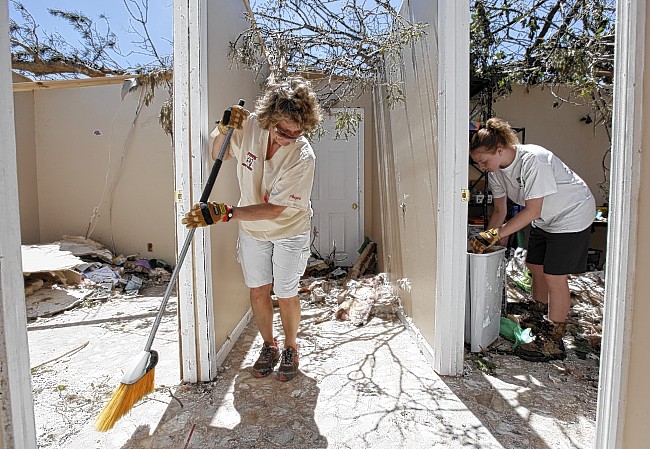 Angie Bailey, 45, left, and her daughter Jashen Bailey, 14, clean the inside of Victory Baptist Church's fellowship hall while looking for salvageable items Friday morning in Rainsville. Alabama, two days after a massive tornado reeked havoc on their community.
Staff Photo by Dan Henry/Chattanooga Times Free Press
Angie Bailey, 45, left, and her daughter Jashen Bailey, 14, clean the inside of Victory Baptist Church's fellowship hall while looking for salvageable items Friday morning in Rainsville. Alabama, two days after a massive tornado reeked havoc on their community.
Staff Photo by Dan Henry/Chattanooga Times Free PressTIPS FOR PARENTS• After a child has been through a trauma, consider reducing the time he or she spends watching the news or scary movies to help prevent nightmares.• Don't think in terms of "talking" to your child, but rather think in terms of "listening to how the traumatic incident has been experienced by your child."• Ask questions such as: "Do you have any questions about what has happened or anything anyone has said?" "What worries you the most now?" and "What is the worst part, the hardest part for you now?" That can help children feel more able to talk to parents.Sources: National Institute for Trauma and Loss in Children
HACKLEBURG, Ala. - Five months is a long time to a 4-year-old girl.
But when you're 4 and you've just seen your grandfather's house collapse around you while you sit huddled in the bathroom, your nearly 2-year-old brother in your grandfather's arms and you in your mother's, it's not likely you'll soon forget your fear of storms - no matter how old you are.
Today, Lane Steward, who survived in her grandfather's bathroom in Hackleburg - the only room left standing after the April 27 tornado - talks excitedly about having teddy bear tea parties at the preschool she attends two days a week - after she gets over being shy, that is. And her 2-year-old brother, Landon, no longer clings to his mother, Amber Steward, day in and day out.
"I was surprised [he did that], because he was only 14 months old during the storm," Steward said. "He wouldn't let me put him down. But about a week after that, day by day, it got better."
Lane, though, is just now getting to a point where she doesn't run and hide behind the kitchen counters or the couch, crouch down and cover her head at the first sign of dark clouds outside, Steward said.
"What have we talked about?" she prompted Lane. "What can't hurt you when you're in the house?"
"Thunder, lightning, rain," Lane recited happily.
But what Lane learned April 27 is that sometimes mere walls aren't enough.
Still, Steward has encouraged Lane to think positively.
"There are alarms," Lane said. "And every storm doesn't have a tornado."
Steward said that, just in the past few weeks, Lane has stopped fixating on tornadoes.
"Anything anybody said, she absorbed," Steward said of the first months after the storm. "Then the summer came and she got on a kick about hurricanes. We had to explain that they don't happen here."
Lane, who remembers the details of April 27 only vaguely now, said she didn't cry when the tornado hit - she screamed.
"It sounded like 'boom,'" she said of the tornado.
"And did it mess up the house just a little bit or did it destroy it?" Steward asked.
"Destroyed it," Lane answered, obviously pleased with herself for knowing the correct answer. "I saw Sheetrock, and the TV was still there, the bed was still there and it had dirty stuff [on it]."
"We would talk anytime she wanted to talk about it," Steward said. "But I'm glad she doesn't so much anymore. It means she's not obsessing over it anymore."
Kay Parker, director of The Healing Place, a nonprofit grief support center for children and teens, said that after a trauma it's important to help children cope.
For instance, after a natural disaster, creating a safety plan in case of another disaster can make children feel at ease, she said. Likewise, it's necessary to help children understand that just because something happened once doesn't mean it's going to keep happening.
"When someone dies, it's common for a child to ask, 'Who else might die?'" Parker said. "With a tornado, they might be worried that another one will come. The mind hangs on to that until we resolve it, whether it's death or a tornado."
Parker said helping children see that rain doesn't always have to be scary is helpful, too.
"One parent was acting like the tornado, spinning around, saying, 'Whoosh, whoosh,' and the kids were just laughing," she said. "It's that distraction of acting out what they fear. The key to how a child reacts is how a parent reacts."
Other tactics might be showing a child what good rain can do, such as using sentences like, "Rain is scary, and it's going to make the flowers grow," Parker said, emphasizing the "and" in the sentence.